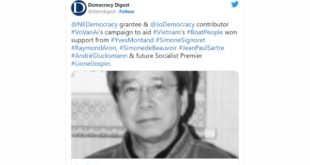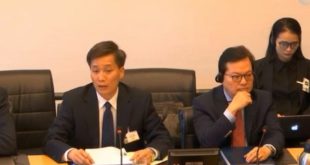HO CHI MINH CITY (AFP) – Tens of thousands of people marked the 30th anniversary of the end of the Vietnam War with a colourful commemoration that pushed aside communist ideology to focus on economic prosperity.
The entire city centre was decked out with large, colourful banners and flowers on Saturday to remember the fall in 1975 of the southern hub then known as Saigon, and the defeat of US-backed South Vietnamese regime.
People massed in front of the former regime’s presidential palace, now called Reunification Palace, to watch the gala celebrations attended by leaders including Communist Party General Secretary Nong Duc Manh, President Tran Duc Luong and Prime Minister Phan Van Khai.
Reflecting changing times, the commemoration was heavily accented on the city’s economic achievements and Luong paid tribute to its economic prowess, reflecting the country’s own agenda.
“The city can create major internal capacities and attract a great deal of foreign investment and mobilise human resources from other regions. It is the engine accelerating the southern region and the whole country,” Luong said.
“Ho Chi Minh City has had several years of rising growth, especially in the first five years of the 21st century,” Luong said. “The city should persist with its reform policy and with greater vigour, overcoming any weaknesses and obstacles in the path of development.”
A grand parade followed, with soldiers and students enacting phases of the war, but the history soon gave way to displays of the city’s current preoccupations.
Floats featuring the Internet, the ubiquitous state-run tour operator Saigon Tourist and the state-run Vietcombank rolled past.
Large portraits of venerated communist party founder Ho Chi Minh competed for attention with motorcycles and young girls dancing in pink tutus.
Girls in sequined blue tee-shirts pushed a local supermarket’s trolleys filled with goodies, while a helium balloon display by the flag carrier Vietnam Airlines raised cheers from the mostly young onlookers.
About two-thirds of Vietnam’s 82 million population is under 30 years old. For them, the war that marked their parents is history.
Ho Chi Minh City, which officially has seven million residents, or 8.6 percent of the population, accounts for 20 percent of the country’s gross domestic product and 40 percent of exports and industrial output, according to official figures.
The new emphasis was welcomed by some observers.
“I prefer this to a North Korean-style parade,” said a foreign observer requesting anonymity, referring to the Stalinist regime’s tightly controlled parades that have a strong political tone. “The Saigonese have got rid of politics.”
The fall of Saigon on April 30, 1975, came after 55 days and nights of fighting and sealed the defeat of the United States in Southeast Asia, strengthening the communist party still in power today.
Some three million Vietnamese and 58,000 Americans were killed in the fighting.
Khai, the prime minister, said in a speech Friday that Vietnam wanted to move on from past enmity and advance ties with its one-time “aggressors”.
“We advocate friendly cooperation to strengthen relations with countries that took part in the Vietnam War,” Khai said in an address in Hanoi to top Vietnamese leaders, war veterans and foreign envoys, including US ambassador Michael Marine.
Khai urged all Vietnamese, including those overseas, to work for national unity and to help build the country. Some 2.7 million people of Vietnamese origin live abroad, about half of them in the United States.
However, Paris-based dissident leader Vo Van Ai called attention to the absence of democracy in Vietnam.
“Today, 30 years later, there is still no democracy in Vietnam. No opposition parties, no free trade unions, no free press, no independent NGOs,” Ai said in a faxed message.
“For the past 30 years, Vietnamese people have been living in a world of the dumb — we are forbidden to speak, and anyone who dares speak out risks immediate arrest,” Ai said.
 Quê Me Quê Me: Action for democracy in Vietnam & Vietnam Committee on Human Rights
Quê Me Quê Me: Action for democracy in Vietnam & Vietnam Committee on Human Rights



